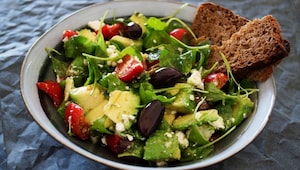How to Look After Your Skin if it's Been Affected by Over-Indulgence
Sugar, alcohol and a lack of sleep can take it's toll on your skin.

From breakouts to puffiness - the first signs of a few weeks of excess (chocolate, wine, late nights and a lax exercise regime) show up on your skin. Fortunately, the effects over-indulgence can be easily remedied. Here, skin and nutrition experts reveal how to get your glow back...
How does Christmas affect our skin?
Christine Bailey, Nutritionist and skin expert on behalf of The Harley Medical Group, explains how sugar, in particular, can wreak havoc: 'Sugary snacks, sweet treats, puddings and excess carbs lead to a sudden rise in blood sugar and the production of excess insulin. This results in the production of certain growth factors particularly insulin like growth factor (IGF-1) that stimulate sebum production and exacerbate hormone imbalances, leading to spots and skin redness.'
Quality Streets and chocolate yule log aside, partying, especially alcohol consumption, can play its part in poor skin health. Justine Hextall, dermatologist Harley Medical Group explains that party season is always difficult for skin, says: 'The combination of late nights, excessive alcohol and party foods can really take its toll. When we drink to excess the first problem is dehydration. Alcohol also causes vessels to dilate hence skin becomes flushed, over time this redness can persist and thread veins can become visible.
'Mild facial eczema can develop and skin can become generally dry and sensitive. Party food tends to be processed and salty, this dehydrates skin and causes the body to hold onto water which can give the face a bloated appearance with often puffiness around eyes. Snacks are often high glycaemic index foods that damage collagen through a process known as glycation.'
[embed type='article']37173[/embed]
It's not just what you do at Christmas, but what you don't do. Justine explains more: 'When we are partying hard it's not just the type of food that we are consuming that will affect our skin but the food we are not eating such as fresh fruits and vegetables. We tend to pick up a quick fix before we go out, often fast food or a ready meal.
'Once we are at the party we often eat high glycaemic index foods such as pastries, crisps and sugary treats. We know that the sugar from these foods causes glycation of collagen which damages it. Also a poor diet full of so called junk food affects the bio-diversity of our gut flora. We talk a lot now about how changes to our intestinal microbiome can influence skin health. We call it the gut-skin axis.'
Post-Christmas skincare advice
1. Choose foods rich in vitamin C
Christine explains that it's time to put down the choccies and each for something else instead: 'Instead of always reaching for a sugary snack, try snacking on antioxidant and vitamin C rich fruits like berries, pomegranate and citrus fruits. These help protect the skin, support cleansing and the production of collagen for healthy, glowing skin.'
2. Party-proof skin before heading out
If you're celebrating New Year's Eve, take some time to limit the damage of the late nights' and alcohol intake: Justine says: 'My advice is to try and balance your diet in the days leading up to a party. Before going out, try to do some exercise as studies have shown we tend to make healthier choices in the hours after exercise. If possible eat a balanced meal and drink plenty of water. Whilst at the party try and alternate drinks with either a glass of water or a non-alcoholic alternative. On arriving home rehydrate before bed and apply a hydrating emollient preferably with anti-oxidants to facilitate skin repair.'
And post-party? "Try and avoid that bacon sandwich the morning after - a smoothie with berries and avocado would be a much healthier skin fix," says Justine.

3. It sounds obvious, but drink lots of water
Your cheapiest and most convenient post-Christmas skin trick could be as easy as turning on your kitchen tap, suggests Christine. 'Alcohol is not only high in sugar but can be very dehydrating which can cause the skin to look tired and dull. A build-up of toxins can also take its toll on the liver and our ability to cleanse.
'This can show up on our face making it less than radiant looking. Hydrate by drinking 6-8 glasses of water or try warm water with a little fresh lemon juice added. Other healthy options include coconut water, herbal teas and green tea rich in skin protective antioxidants.'
Christine's top tip: To give your skin a boost, why not make up a delicious antioxidant rich green smoothie to kick start the day? Try a blend of spinach or kale, pineapple with a spoonful of protein powder and cleansing superfood green powder for a skin glowing tonic.
4. Avoid a yo-yo diet
It might be tempting to go cold turkey in the days after Christmas, opting for calorie restrictions and juice cleanses, but this isn't advised. Instead, Justine recommends a balanced diet, with alcohol-free days, skin-boosting nutrients and exercise. She advises: 'There is a lot of evidence now that yo-yo dieting and irregular sleep patterns harm our general health - so I wouldn't advocate a feast and famine approach. Alcohol free days are recommended as the best approach to allowing our bodies to recover and repair.
'It is a fact of life that most of us will have periods where we eat and drink to excess. As long as this is balanced with longer periods of healthy food, minimal alcohol and some exercise we can probably allow ourselves to relax from time to time. I am not in favour of alternating a poor diet high in processed foods and excessive alcohol with a week of abstinence, e.g. vegetable smoothies and water. A balanced diet, rich in antioxidants and foods that support a healthy skin barrier, such as oily fish, avocado and nuts and seeds will definitely protect skin against daily stresses and help to get that skin glow.'
[embed type='article']37069[/embed]
5. Use hydrating ingredients and avoid disturbing the skin's protective barrier
Justine Hextall explains that to keep skin nourished you have to think about how to hydrate skin and how to maintain it. Avoid excessive alcohol and drink water alongside wine, for example. If you are working in a dry, central heated office, make sure you drink plenty of water during the day. Swap coffee for green tea, so your skin benefits from the antioxidants.
When it comes to skincare, she says: 'Make sure your cleanser is gentle and able to cleanse your skin without disrupting your skin barrier . If we disrupt our skin barrier we have increased trans-epidermal water loss leaving our skin dry and often more irritant. Finally we need to find a moisturiser that will have attract water to the skin, e.g. with a substance that retains mositure, such as glycerine or hyaluronic acid. We also want prevent water loss so a richer moisturiser will be more effective than a lotion in this respect. In my view skin hydration is vital. Calm, hydrated skin has that youthful glow.'
6. Indulge in a facial
Bryony Blake, Makeup artist The Harley Medical Group, says the most important thing for problem skin is making sure you're using the correct skin care. 'Try getting into a really good routine and going for a facial at least once a month,' she says. 'This is key to achieving a flawless base. I often recommend trying to incorporate a treatment such as a resurfacer which helps increase cell turnover, whilst treating any active acne and preventing further breakouts.'
7. Eat your skin healthier
Vitamins A, C, E and K are essential to healthy skin and can be effective when applied topically and well as including them in your diet. Christine Bailey gives advice on what we should be eating to help combat the effect of lack of sleep:
- Vitamin C can strengthen blood vessel walls so include berries, cranberries, leafy greens – including Brussels sprouts, of course, and red peppers which are all rich in vitamin C.
- Orange, vitamin A-laden fruits and vegetables such as papaya, mangoes, pumpkins, sweet potatoes, carrots, butternut squash can promote strong, firm skin.
- Vitamin K strengthens capillary walls and often broken capillaries leak deoxygenated blood to form dark circles. So include leafy greens, kefir, natto (fermented soy bean product), yogurt, prunes, aubergine and leeks, which are all good sources of vitamin K.
- Be sure to allow yourself a few quiet nights in to catch up on sleep. A cup of chamomile or lemon balm tea before bed will help you wind down ready for a long night's sleep. Or try a cup of warm Montmorency cherry juice too – one of the few food sources of melatonin, a.k.a our sleep hormone!
more from Beauty

If a man wears this, date him….

Vanishing acts or forever energy? Here’s how you can enter the new year with a happy heart

Four celeb-inspired salad recipes are what January lunches should be made of

This year’s beauty trends, written all over our faces

Anya Singh is just getting started

Forget New Year's resolutions, this is Team Cosmo’s official f**k it list

Bows are back and they’re not playing cute anymore

If you’re celebrating this season, you’ll want to do it at Shangri-La Eros New Delhi

Ayushmann Khurrana reflects on navigating Bollywood, being embraced as an outsider, and the layered realities of fame

Your guide to all the cute accessories for elevating every party look!
